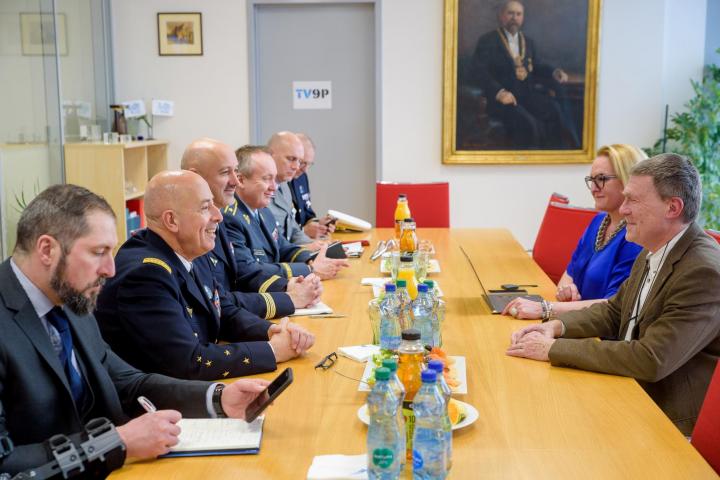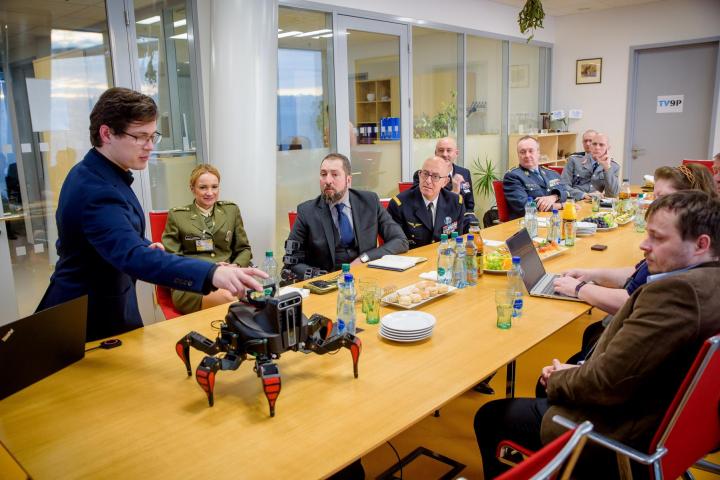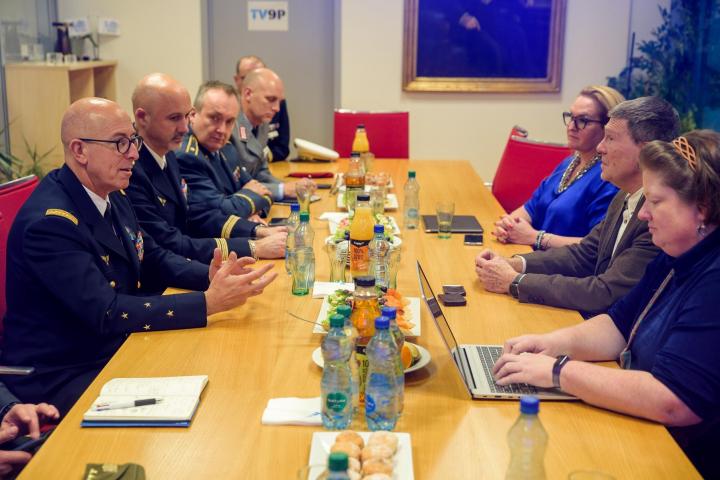Among the fields of cooperation in which CTU in Prague can significantly help are artificial intelligence, quantum technologies, cognitive warfare, cyber defence, wargaming, 3D or additive technologies and, of course, medical systems and saving lives.
General Lavigne, for example, commented on artificial intelligence, saying that he himself was part of a project where mapping of the operational area was carried out; a large amount of data was then processed through AI so that the resulting visualisations facilitated action during operations. "So these are direct innovations, this is what CTU will be able to help with," added Zbyněk Škvor, Vice Rector of CTU.
"I am glad that our university can be involved in projects involving such an important partner as NATO Allied Command Transformation . And I appreciate the support of the DefSec team in building this cooperation," said Vojtěch Petráček, Rector of CTU.
Concerning cognitive warfare, the NATO delegation - CTU leadership meeting showed that this topic resonates very intensively in NATO. DefSec is working with academics on a research project to describe the physiological effects of cognitive warfare methods on individuals and to suggest ways of remediation. "We want to understand this issue better and learn how to protect our people. There is a whole new group being set up in Norfolk to look at this and international collaboration across all NATO allies is important," said General Lavigne.
After the introductory talks, concrete examples of cooperation were presented by scientists from CTU. The digital triage was presented by the team of doc. Miroslav Bures from the Faculty of Electrical Engineering of CTU. The aim of this project is to try to increase the chances of rescue and survival for soldiers in the field during a real operation when there is a risk of injury. The system enables monitoring of basic life functions and evaluates the current situation of the wearer. The companion application has several levels and approaches, it can serve both the commanding officer as a source of information about the location and condition of his men, and it can serve the rescuers to evaluate and review the situation of the needed interventions.
Autonomous robots were presented at the meeting by Dr. Jan Bayer from FEL CTU. The project specializes in the development of algorithms for autonomous movement of robots in unknown environments and their safe mapping. Different types of robots and different platforms are used. In military operations, this involves initial exploration of dangerous areas and information gathering. The spider-shaped robot SCARAB was presented, its control capabilities and passage through unknown environments were demonstrated. Professor Jan Faigl's team is constantly comparing the results with other teams across the world. The robots are fully autonomous and do not need the presence of mobile networks - they are designed for situations where networks and human operators are not available, which is important for military use.
The next presentation was led by Dr. Michal Křelina from Faculty of Nuclear Sciences and Physical Engineering, who is a long-term advisor to NATO in the field of quantum technologies. Quantum technologies are a very dynamic topic, with new publications coming out every day on possible applications for space, civilian sphere and defence or rescue systems. The participants agreed that not only the area of direct use of quantum technologies is important, but also their safety or resistance to disarmament.
All possible applications were discussed - security, encryption, communication, navigation, detection. However, education is key in this area because it is a technologically challenging area to understand and a soldier does not necessarily have to be a quantum physicist. General Lavigne expressed an "absolute yes" to the articulated need to get new technologies into military schools so that the military is ready when these technologies mature to real-world applications. The Army, he said, must be ready to adapt them immediately.
The participants agreed that DefSec, in cooperation with CTU, has been very helpful in responding to topics that have been resonating across NATO countries for the past ten years. "It is good to cooperate, it will help us find solutions faster and respond more flexibly to changing realities. I commend the collaboration between DefSec and CTU, we need to engage young people in solving the pains of this world. We are all connected, we are a team. We will definitely continue to work together!" said General Phillipe Lavigne in total agreement with CTU Vice Rector Zbyněk Škvor.


